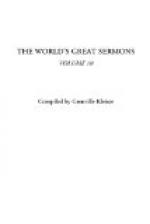Now if I felt that, if I was sensible of the haunting presence of Christ by that Galilean shore, how much more these disciples, in whose minds every aspect of the Galilean lake was connected with some intimate and thrilling memory of the ministry of Jesus.
Christ once more stands among the common things of life; the fire, the fish, the bread—all common things; a group of tired, hungry fishers—all common men; and He is there to affirm that in His resurrection He had not broken His bond with men, but strengthened it—wherever common life goes on there is Jesus still.
I. Notice the words with which the story opens, and you will see at once that this is the real clue to its interpretation. “When morning had now come, Jesus stood on the shore, but the disciples knew not that it was Jesus.” A strange thing that! Why did they not know Him? Because they were not looking for Him in such a scene. It had seemed a natural thing, if Jesus should appear at all, that He should appear in the garden, a vision of life at the very altar of death. It seemed yet more probable and appropriate that He should appear in the upper room, that room made sacred by holiest love and memory. If any words of Christ yet lingered in the mind and had power to thrill them, they were surely these words, “Ye shall see the Son of man coming in the clouds of heaven,” glorified, triumphant, lifted far above the earth and its humble life. And so, if they were looking for Christ at all that morning, I think they watched the morning clouds, expecting Him to come down the resplendent staircase of the sunbeams to call the nations together and vindicate Himself in acts of universal judgment. And behold! Jesus comes as a fisherman standing on the lakeside, busy over a little fire, where the morning meal is cooking; and behold! Jesus speaks, and it is not of the eternal mysteries of God, not of the solemn secrets of the grave, but of nets and fishing and how to cast the nets—the simple concerns of simple men engaged in humble tasks.
No wonder they did not recognize Him. Once more the Son of Man comes eating and drinking, and even the eyes that knew Him best can not see in this human figure by the lakeside the only begotten Son of the Father, full of grace and truth. They looked and saw but a fellow fisherman, cooking his meal upon the shore, and they knew not that it was Jesus.
II. Think for a moment of the earthly life of Christ, and you will see that it was designedly linked with all the common and even the commonest things of life.
If you or I could have conceived the great thought of some human creature that should be the very incarnation of God, what would have been the shape of our imaginings? Surely we should have chosen for this earthly temple of the Highest some human form perfected in grace and beauty by the long refinements of exalted ancestry; the child of kings or scholars; the delicate flower of life, in whom the elements were so subtly mixed that we should recognize them as special and miraculous—so we might think of God manifest in man. But God chooses for the habitation of His Spirit a peasant woman of Nazareth, humble, poor, unconsidered.




